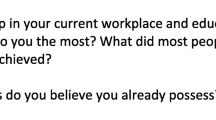Abstract
This paper explores the professional development needs of leaders in response to emergent demands for leadership and competing pressures within the changing landscape of Australian international education. Framed within Bourdieu’s concepts of field and habitus, this study addresses five dimensions of professional development needs reported by leaders in international education: understanding of and skills to work across cultural differences, knowledge of and expertise to respond to policy changes and emergent trends, leadership and management skills targeted for internationalisation, networking and relationship management skills to work with increasingly diverse and ‘non-traditional’ stakeholders and research skills. However, the social field in which these leaders are functioning is causing tensions for their continuing professional development, including existing institutional governance and structures, financial constraints and the institutional culture that has not put internationalisation on the top of institutional development agenda. The study indicates a critical need for tackling obstacles and supporting sustainable situated professional learning for these leaders so as to enhance their capacities and impact as key players in international education. This study provides empirical and theoretical insights for institutions involved in international education to build effective policies and practices for enhancing professional development for the sustainable international education leadership.
Similar content being viewed by others
References
Beelen, J., & Jones, E. (2015). Europe calling: a new definition for internationalisation at home. International Higher Education, 83, 12–13.
Bourdieu, P. (1990). The logic of practice. Stranford: Stanford University Press.
Bourdieu, P. (1998). Practical reason: on the theory of action. Stanford: Stanford University.
Bourdieu, P., & Wacquant, L. (1992). An invitation to reflexive sociology. Cambridge: Polity Press.
Coleman, D. (2003). Quality assurance in transnational education. Journal of Studies in International Education, 7(4), 354–378.
Curtis, S. (2013). Implementing internationalisation. Perspectives: policy and practice in higher education, 17(2), 42–47.
Dall'Alba, G., & Sidhu, R. (2015). Australian undergraduate students on the move: experiencing outbound mobility. Studies in Higher Education, 40(4), 721–744.
Daly, A. (2011). Determinants of participating in Australian university student exchange programs. Journal of Research in International Education, 10(1), 58–70.
De Wit, H. (2015). Recent trends and issues in international student mobility. International Higher Education(59):13-14.
De Wit, H. (2018). Leadership challenges in higher education internationalisation: from ad hoc, marginal and fragmented to comprehensive requirements. In J. Beelen & J. Walenkamp (Eds.), Leading internationalisation in higher education: People and policies (pp. 41–47). The Hague: The Hague University of Applied Sciences.
De Wit, H. (2012). The changing role of leadership in international education. University world news. Retrieved on 20/09/2019 from http://www.universityworldnews.com/article.php?story=20120605143929407. Accessed 20 Sept 2019
Deakin, H. (2013). How and why we should encourage undergraduate geography students to participate in the Erasmus programme. Journal of Geography in Higher Education, 37(3), 466–475.
Dumenden, I. E., & English, R. (2013). Fish out of water: refugee and international students in mainstream Australian schools. International Journal of Inclusive Education, 17(10), 1078–1088.
Edgerton, J. D., & Roberts, L. W. (2014). Cultural capital or habitus? Bourdieu and beyond in the explanation of enduring educational inequality. School Field, 12(2), 193–220.
Egron-Polak, E., Hudson, R., & Gacel-Avila, J. (2010). Internationalisation of higher education: Global trends, regional perspectives: IAU 3rd global survey report. Paris: International Association of Universities.
Elo, S., & Kyngäs, H. (2008). The qualitative content analysis process. Journal of Advanced Nursing, 62(1), 107–115. https://doi.org/10.1111/j.1365-2648.2007.04569.x.
Heng, T. T. (2019). Understanding the heterogeneity of international students’ experiences: a case study of Chinese international students in US universities. Journal of Studies in International Education, 1028315319829880.
Heyl, J. D., & Tullbane, J. (2012). Leadership in international higher education. The Sage Handbook of International Higher Education, 113-130.
Hudzik, J. K. (2014). Comprehensive internationalisation: Institutional pathways to success. New York: Routledge.
Hudzik, J. K., & Stohl, M. (2012). Comprehensive and strategic internationalisation of US higher education. D. k. Deardoff, H. de Wit, JD Heyl & T. Adams (Eds.), SAGE handbook of international higher education, 61-81.
Jenkins, R. (2002). Pierre Bourdieu (2nd ed.). New York: Routledge.
Jones, E., & Killick, D. (2013). Graduate attributes and the internationalized curriculum: Embedding a global outlook in disciplinary learning outcomes. Journal of Studies in International Education, 17(2), 165–182.
Kettle, M. (2005). Agency as discursive practice: from “nobody” to “somebody” as an international student in Australia. Asia Pacific Journal of Education, 25(1), 45–60.
Knight, J. (2004). Internationalisation remodeled: definition, approaches, and rationales. Journal of Studies in International Education, 8(1), 5–31.
Kosmützky, A., & Putty, R. (2016). Transcending borders and traversing boundaries: a systematic review of the literature on transnational, offshore, cross-border, and borderless higher education. Journal of Studies in International Education, 20(1), 8–33.
Leask, B. (2015). Internationalizing the curriculum. New York: Routledge.
Marginson, S & van der Wende, M (2006). Globalisation and higher education, OECD.
Marginson, S. (2018). Trends in global education. Speech at Centre for Global Higher Education. Oxford: The University of Oxford.
Maringe, F. (2009). Strategies and challenges of internationalisation in HE: an exploratory study of UK universities. International Journal of Educational Management, 23(7), 553–563.
McBurnie, G., & Ziguras, C. (2014). Governing cross-border higher education. London: Routledge.
Middlehurst, R. (2008). Leadership and internationalisation. In C. Shiel & A. McKenzie (Eds.), The global university: the role of senior managers (pp. 15–19). London: DEA.
Murray, D., Goedegebuure, L., Van Liempd, H., & Vermeulen, M. (2014). Leadership needs in international higher education in Australia and Europe. EAIE: Amsterdam, the Netherlands.
Nolan, R., & Hunter, F. (2012). Institutional strategies and international programs: learning from experiences of change. In D. K. Deardorff, H. de Wit, J. D. Heyl, & T. Adams (Eds.), The SAGE handbook of international higher education (pp. 131–145). Los Angeles, London, New Delhi, Singapore, Washington: SAGE.
Streitwieser, B., & Ogden, A. C. (2016). International higher education’s scholar-practitioners: bridging research and practice. Oxford, Symposium Books Ltd.
Tran, L. T. (2016). ‘Mobility as becoming’: a Bourdieuian analysis of the factors shaping international student mobility. British Journal of Sociology of Education, 37(8), 1268–1289.
Tran, L. T., & Soejatminah, S. (2016). ‘Get foot in the door’: International students’ perceptions of work-integrated learning. British Journal of Educational Studies, 64(3), 337–355.
Tran, L. T. (2011). Committed, face-value, hybrid or mutual adaptation? The experiences of international students in higher education. Educational Review, 63(1), 79–94.
Tran, L. T. & Marginson, S. (2018). Internationalisation of Vietnamese higher education: An overview. In L. T. Tran & S. Marginson. (2018). (Eds), Internationalisation in Vietnamese Higher Education. (pp.1–18). Dordrecht: Springer.
Tran, L. T. Glen Stafford, Thao Thi Phuong Vu & Mark Rahimi. (2019). Engagement with Asia via the New Colombo Plan: Impact on Australian Students’ Career Directions and Employability. In Hong T. M. Bui, Hoa T. M. Nguyen and Doug Cole (Eds.). Innovate Higher Education to Enhance Graduate Employability, pp.95–106. Abingdon: Routledge.
Yemini, M., Holzmann, V., de Wit, H., Sadeh, E., Stavans, A., & Fadila, D. (2015). The drive to internationalize: perceptions and motivations of Israeli college directors. Higher Education Policy, 28(3), 259–276.
Acknowledgements
We would like to express our thanks to the two anonymous reviewers for their very helpful feedback and suggestions that help us significantly improve this manuscript. We acknowledge the valuable contributions of the international education leader participants in this research. We are grateful to the leader-respondents in this research who share with us valuable insights into their professional development needs and practices.
Funding
We acknowledge the funding support for this research from the Australian Research Council.
Author information
Authors and Affiliations
Corresponding author
Additional information
Publisher’s note
Springer Nature remains neutral with regard to jurisdictional claims in published maps and institutional affiliations.
Rights and permissions
About this article
Cite this article
Tran, L.T., Nghia, T.L.H. Leadership in international education: leaders’ professional development needs and tensions. High Educ 80, 479–495 (2020). https://doi.org/10.1007/s10734-019-00494-1
Published:
Issue Date:
DOI: https://doi.org/10.1007/s10734-019-00494-1




